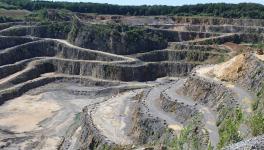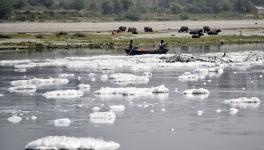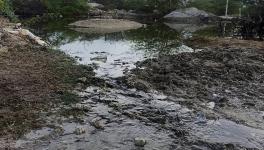High Levels of Toxic Chemical 'Nonylphenol' in Water Across India Concerning: Study
Representational use only. Image Credit: Shutterstock.Com
The toxic chemical Nonylphenol has been found in high levels in water samples collected from across India, according to a new study by Toxics Link.
Released on June 28, the study entitled ‘Toxic Chemical “Nonylphenol”: A Barrier to Safe Drinking Water’, raises concerns over high levels -- 29.1 to 80.5 ppb (parts per billion) -- of Nonylphenol in drinking water in the country.
The Toxics Link study found the harmful chemical’s presence in all 15 water samples, including 12 tap water and three drinking water samples, collected from different parts of India. The samples were then sent to the Shriram Institute of Industrial Research, New Delhi for testing.
The study noted that the Nonylphenol concentrations in water samples were 29 to 81 times higher than the Bureau of Indian Standards’ (BIS) prescribed limit for phenolic compounds in drinking water, which is 1 ppb. The gaps are even higher compared to the US EPA safety standard for freshwater quality.
The BIS is yet to set a specific standard for Nonylphenols in drinking and surface waters in India.
The study found the highest concentration of the chemical (80.5 ppb) in a borewell water sample from Bathinda. The lowest concentration of it was found in the tap water from government supply water in Indraprastha, New Delhi (29.1 ppb).
Out of three drinking water samples, two samples were filtered, but had 61.5 ppb of Nonylphenol in Ghaziabad, Uttar Pradesh and 58.8 ppb in Sancole, South Goa. The third sample from Bhatinda, Punjab, was RO-treated and had 61.1 ppb level.
Piyush Mohapatra, Senior Programme Coordinator, Toxics Link, said in a press release that “Nonylphenol is a toxic chemical and a well-known endocrine disruptor associated with a number of adverse effects on human health. Daily intake of Nonylphenol through drinking water can have adverse health impacts on citizens.”
There is an acute lack of regulations in the country to restrict or phase out NPEs in detergents and other consumer products. Therefore, there is no mechanism in place to prevent the release of Nonylphenol into the environment, and especially water bodies.
A 2019 study by Toxics Link had confirmed the presence of Nonylphenol in detergents sold in the Indian market. It also detected the chemical in notably high quantity in all the river and lake samples tested in the 2019 study.
The chemical is commonly used in the production of Nonylphenol Ethoxylates (NPEs), which are used as surfactants and in common consumer products such as detergents and wetting agents, among others. NPEs enter the environment and ultimately break down to Nonylphenols that can enter different environmental matrices such as water, soil, etc. according to the new study.
Toxics Link’s press release noted that several research studies have confirmed that Nonylphenol can disrupt the endocrine system of human beings and also impact aquatic life and wildlife. The United Nations Environment Programme has also designated Nonylphenol as a chemical of global concern, it added.
Get the latest reports & analysis with people's perspective on Protests, movements & deep analytical videos, discussions of the current affairs in your Telegram app. Subscribe to NewsClick's Telegram channel & get Real-Time updates on stories, as they get published on our website.
























